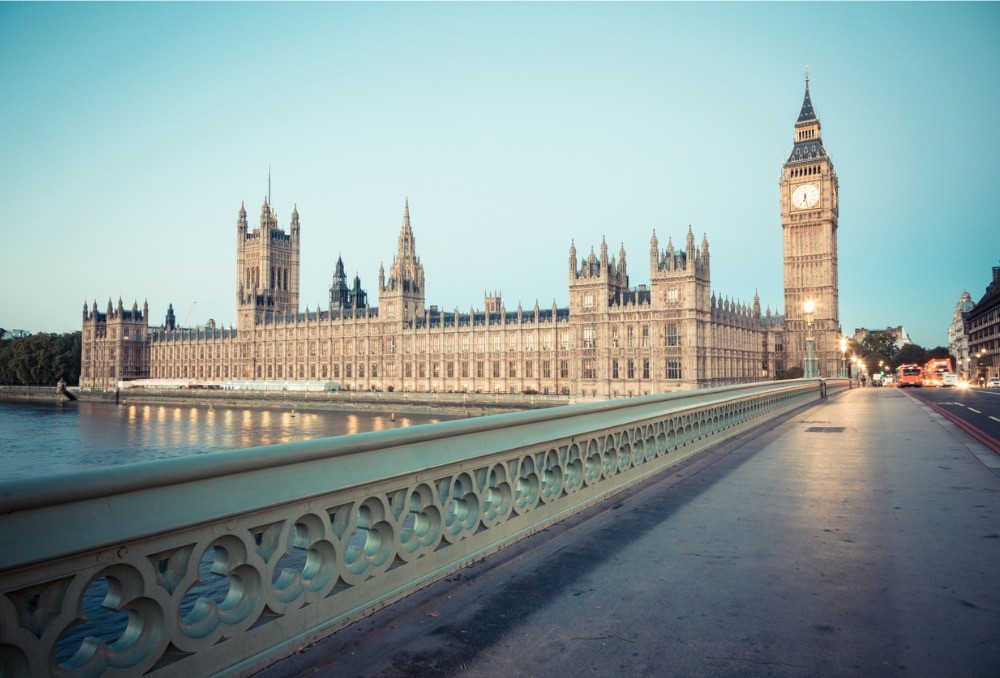In the thick of it: lessons from Westminster about how to shape policy with science
By Matthew Hannon - Posted on 25 May 2023
Matt Hannon recently took part in a scheme which paired researchers with UK parliamentarians. Here, he details some lessons he learned from his time in Westminster.
The past year for me might best be captured by a quote from the potty-mouthed Director of Communications, Malcolm Tucker in ‘The Thick of It’: "I’ve got a to-do list here that’s longer than a [...] Leonard Cohen song" (Ianucci, 2009). Still, having churned out my latest energy policy paper, I decided it was time to put theory into practice. I resolved to plunge myself squarely in ‘the thick of it’ and applied to join the Royal Society’s Pairing Scheme for their ‘Week in Westminster’.
The scheme pairs 30 leading researchers with UK parliamentarians and civil servants, offering them an opportunity to experience each other's worlds, so they can better support one another. As a researcher who seeks to influence government policy, I’d been very focused on Scottish Government policy since my arrival in Glasgow in 2016. Consequently, despite having worked in London for four years previous to this, Westminster had begun to feel distant. I needed to reconnect. So, with confirmation I’d been accepted, the question was who would I be paired with?
As Professor at the Hunter Centre for Entrepreneurship, within Strathclyde’s Business School, my job sees me teach and research strategies to accelerate the democratisation and decarbonisation of our energy sector. In the context of a spiralling cost of living crisis, spearheaded by crippling energy prices and a painfully energy inefficient housing stock, I believed my work would be useful to a local MP. After all, I’m one third of the podcast Local Zero, which is all about supporting climate action on your doorstep. Thankfully I was right and Alison Thewliss - the Scottish National Party MP for Glasgow Central – accepted my invitation to pair.
I was delighted with the match. Alison’s record on voting and questions in parliament pointed to someone who has a strong appetite to tackle social injustice and climate change. From the outset Alison demonstrated that she understood that ‘business as usual’ is making life harder for her constituents, not easier, and that we must forge a new way forward if we are to raise living standards for all, whilst also averting catastrophic climate change. In short, we were speaking the same language.
Now paired, I booked my train ticket and headed south to Westminster. Despite the dual crises of the cost of living and climate change, the business of the house during the final week in March was primarily focused on the Illegal Migration Bill, or the “Small Boats Bill” as it’s become known. It was sobering stuff, hearing ministers and backbenchers discussing the future of thousands of immigrant families. The tone of the debate was set early on by the Minister for Immigration Robert Jenrick, who made clear that “accommodation for migrants should meet their essential living needs and nothing more, because we cannot risk becoming a magnet for the millions of people who are displaced and seeking better economic prospects” (Jenrick, 2023). In response, I heard Alison and other MPs castigate the government on its plans to manage those seeking asylum. Democratic debate appeared alive and well, for the time being anyway.
So what did I learn from my week in Westminster and what pointers can I offer researchers hoping to influence policy?
MPs and their staff work tirelessly: make their lives easier. Until you witness it first-hand, it’s difficult to understand how hard our elected officials work. Westminster was a constant hive of activity. For most MPs, my sense is their work is all-consuming. It’s not just a day job but a lifestyle, and one where I’m sure most struggle to balance the competing and relentless demands of both home and work. For researchers, this is important. Your guiding mantra should be, “how can I communicate my research at the right time, in a way that can be easily and quickly understood and via channels that can be easily accessed?” If you can achieve that, I’m confident your policy impact will follow.
Policy making takes many different forms. When you think of Parliament, you probably conjure up images of Prime Minister’s Question Time; the cut and thrust of debate, with MPs pogoing on green leather oak benches. After just one morning at Westminster it became clear the House of Commons chamber, akin to the Pyramid Stage at Glastonbury, was merely the main stage amongst a wider festival of policy making. Much of this heavy lifting is done across Parliamentary Committees, where I heard testimony from current and former ministers, as well as expert witnesses, such as the Chair of the Bank of England. And that’s before we even begin to unpack the estimated 750 All-Party Parliamentary Groups (APPGs) that bring parliamentarians together to tackle specific interests (Electoral Reform 2022).
As the sun set, the formal business of parliament began to draw to a close. It was then the Palace of Westminster shifted gear. The earlier rhetoric quickly gave way to dialogue. It is at this time I suspect most parliamentary progress is really made. We were fortunate enough to experience this first-hand; invited to a wine reception where the Pairing Scheme researchers and parliamentarians were joined by representatives from the UK’s foremost science policy institutions. Just next-door to us was another networking event hosted by insurance company Aviva; to my surprise, just one of many industry sponsored events taking place that evening. Further down the corridor still was the famous parliamentarian watering hole Strangers Bar. My inquisitive nature got the better of me and I popped my head around the door. With barely an eyebrow raised at my trespassing, it was clear that there was still much to discuss and the day’s work was not yet done.
For researchers the lesson is this: the opportunities to shape policy assume a myriad of forms. First, understand how and where policy is really made in your field, and then begin reaching out. Concerning then is how little support some universities offer academics to equip them with the knowledge and skills necessary to build these connections. Training for policy impact should be afforded the same standing as research and teacher training.
Forge long-term relationships with parliamentarians and their wider circle. It became clear from the outset of my pairing that it would be trilateral and that I would be working as closely with Alison as I would her senior parliamentary assistant Mhairi Love. This turned out to be a blessing. Not only did I become much more familiar with Alison’s responsibilities as an MP but I was afforded first-hand insight into the key role parliamentary assistants play. Their role is critical to the functioning of parliament; performing a wide-range of roles that range from diary gatekeeper, to policy researcher, to speech writer, to constituent problem solver. Possessing both a breadth and depth of skills, they are the unsung heroes of parliament.
My advice to researchers is to understand the wider ecosystem that your parliamentary ‘ally’ operates in and build relationships with other people who inhabit this. This is because an MP’s time is so precious, it is unlikely to be sufficient for you both to make progress on key issues alone. The other tip is to think about your relationship with a parliamentarian and their team in the long-term. My week in Westminster was just the start, not the end, of my pairing with Alison. Since my visit, I’ve already been working with Alison’s office to help design a survey to understand how and why the energy crisis has hit some of her constituents harder than others. I also hope to reciprocate her generous hospitality and host her at Strathclyde, to uncover how academia both shapes and responds to policy.
Policy and science are still lagging on gender equality. They can help one another achieve it. Alison guided me around the Palace of Westminster and in the entrance to the House of Commons chamber Alison pointed to a photo taken a few years back, with all living past and present female MPs. Shockingly, there are more elected male MPs in the Commons today than there have ever been elected female MPs. Furthermore, there are currently 225 female MPs, making up just 35% of the house (UK Parliament 2023). Academia also has a major gender equality problem. Women are underrepresented in senior management roles, are paid less within the same occupations and account for a higher share of academics leaving science versus men (Advance HE 2021).
Despite this, partnering with Alison and Mhairi, as well as meeting a huge number of other inspirational women on the Pairing Scheme, I left with hope that we’re on the right path towards gender equality. With tremendous work still to be done however, it is clear that researchers can provide policymakers with the evidence they need to formulate policies that can progress gender equality across both parliament and higher education.
Science provides evidence and parliamentary debate demands it. Most of us are familiar with Michael Gove’s statement in the lead-up to the Brexit referendum: “I think the people of this country have had enough of experts” (Gove, 2016). I’m not sure many of his Honourable Friends in the Commons got the memo though. I witnessed MPs wield facts as both sword and shield, derived from some underlying research produced from ‘experts’. Evidence matters and science provides it. No debate can possibly progress without the facts necessary to calibrate the terms of engagement.
My favourite moment of my visit came when Alison and Mhairi showed me inside the House of Commons library. There, sandwiched between the House of Commons and House of Lords, was the de facto “House of Science”. Alison was almost as excited as I was to be there. In this splendid Victorian library, we both pawed different reports we’d recently read to inform our work. I sensed in that moment how democracy without science could run aground, like an unmoored boat in a storm. Researchers must therefore remember that their work is part of the lifeblood of debate and by extension, a fully functioning democracy.
As I boarded the last train out of London to Glasgow, I reflected on a whirlwind few days. My abiding take-away was that despite recent attacks on the value of expert opinion, parliament couldn’t properly function without a robust mosaic of scientific evidence to underpin policy design. At the same time, the fortunes and character of science are shaped by the legislation passed by parliament. I left with a profound sense that these two worlds had drifted apart of late but now there was a growing appetite to reconnect. During these times of global uncertainty, the odd couple of science and policy have never needed one another more.










